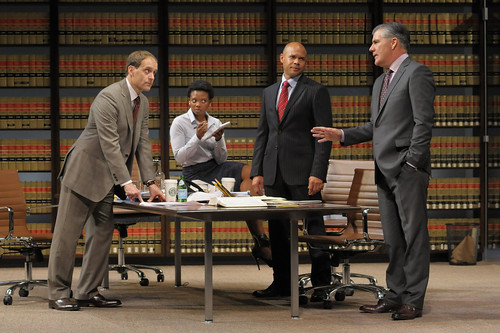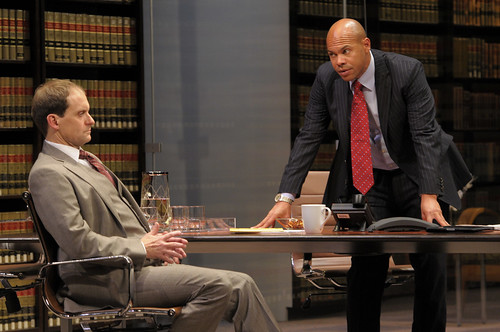The cast of American Conservatory Theater’s Race includes (from left) Anthony Fusco, Susan Heyward, Chris Butler and Kevin O’Rourke. Below: Law partners Lawson (Fusco) and Brown (Butler) square off over a tendentious case. Photos by Kevin Berne
David Mamet never fails to fog me up.
He’s never been one of my favorite playwrights because, although he’s a wizard of compelling dialogue and unquestionable intelligence, his view of the world is just too bleak for me. Finding kindness and compassion and spirituality in his work is never as easy as finding brutality, ugliness and the absolute worst in mankind. I’m not saying he’s wrong in his assessment, it’s just that he makes me feel like Pollyanna in comparison. I don’t need a steady stream of sunshine, flowers and unicorns.
Mamet’s Race is making its West Coast debut in a compelling production from American Conservatory Theater. Director Irene Lewis isn’t messing around, and her quartet of actors attack this too intentionally provocative drama with real courage. They struggle (and partly succeed) to add a needed human dimension to Mamet’s button-pushing editorial cartoon about what he sees as the farce known as the law, the complicated impossibility of human relationships and the insoluble problem of race.
He gives us a law firm headed by a black partner (Chris Butler as Henry Brown) and a white partner (Anthony Fusco as Jack Lawson). Also in their inner circle is a black junior lawyer (Suysan Heyward as Susan, the only female character and the only one without a last name), and they’re all struggling with a potential client. Billionaire Charles Strickland (Kevin O’Rourke), who is white, has been accused of raping a black woman (possibly a prostitute).
“What can you say to a black man on the subject of race?” one character asks. “Nothing.” But Mamet finds plenty to say, and none of it’s good. Humanity is fueled by coffee and gossip, and the law is fueled by three things: hatred, fear and envy. All of that’s true, but there’s so much more. Not in this 85-minute exercise, however.
Mamet’s language is as sharp as ever, and the actors all attack it with gusto, but it’s all just so much talk without any emotional connection to these people. Mamet is most successful at creating some sense of mystery about whether Strickland is guilty or not and how the trio of lawyers goes about determining whether or not to take his case, and if they did, whether or not it’s winnable.
But then Mamet starts throwing his know-it-all punches. Everyone is smarter than everyone else, and everyone’s playing everyone else in one way or another. There’s no such thing as generosity here or genuine feeling because, in Mamet’s world, that’s all grist for the reality of vendettas and ill will and a shared history that damages rather than strengthens.
Race is fun to watch, mostly because the actors – Fusco and Butler in particular – are so adept at making the Mamet-speak seem so real. But this nonstop parade of ugliness (not to mention the high-powered foul language that Mamet seems to relish bombing the stage with) ends up feeling like a skit designed to amuse already cynical lawyers at a national conference for reveling in hideous humanity.
I didn’t feel as beaten up here as I did at the end of Mamet’s Oleanna, and the lack of compelling emotion made Race easier to shrug off, even if the issues it addresses linger long after the curtain calls. Maybe Mamet is right, and we shouldn’t even bother trying to communicate or trying to sort through our problems or are deeply held issues with one another.
I don’t agree with that, so I guess Mamet can go fog himself.
FOR MORE INFORMATION
David Mamet’s Race continues through Nov. 13 at American Conservatory Theater, 415 Geary St, San Francisco. Tickets are $10-$85. Call 415-749-2228 or vsit www.act-sf.org.



Thanks! Very nice assessment!